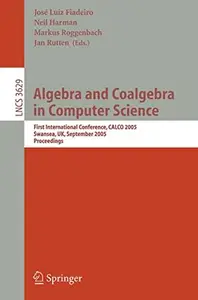- Joined
- Jul 3, 2023
- Messages
- 91,389
- Reaction score
- 1
- Points
- 38

Free Download Algebra and Coalgebra in Computer Science: First International Conference, CALCO 2005, Swansea, UK, September 3-6, 2005. Proceedings By Samson Abramsky (auth.), José Luiz Fiadeiro, Neil Harman, Markus Roggenbach, Jan Rutten (eds.)
2005 | 460 Pages | ISBN: 3540286209 | PDF | 5 MB
This book constitutes the refereed proceedings of the First International Conference on Algebra and Coalgebra in Computer Science, CALCO 2005, held in Swansea, UK in September 2005. The biennial conference was created by joining the International Workshop on Coalgebraic Methods in Computer Science (CMCS) and the Workshop on Algebraic Development Techniques (WADT). It addresses two basic areas of application for algebras and coalgebras - as mathematical objects as well as their application in computer science.The 25 revised full papers presented together with 3 invited papers were carefully reviewed and selected from 62 submissions. The papers deal with the following subjects: automata and languages; categorical semantics; hybrid, probabilistic, and timed systems; inductive and coinductive methods; modal logics; relational systems and term rewriting; abstract data types; algebraic and coalgebraic specification; calculi and models of concurrent, distributed, mobile, and context-aware computing; formal testing and quality assurance; general systems theory and computational models (chemical, biological, etc); generative programming and model-driven development; models, correctness and (re)configuration of hardware/middleware/architectures; re-engineering techniques (program transformation); semantics of conceptual modelling methods and techniques; semantics of programming languages; validation and verification.
Buy Premium From My Links To Get Resumable Support and Max Speed
Rapidgator
69i8m.7z.html
TakeFile
69i8m.7z.html
Fileaxa
Fikper
69i8m.7z.html
Links are Interchangeable - Single Extraction



